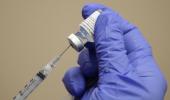'Ideally, the efficacy data of all the trials should be there in the public domain, and as soon as possible.'
'It is difficult to understand the reason behind the authorisation.'

The scientific community in India has been baffled by the way two vaccines -- Covishield from the Serum Institute and Covaxin from Bharat Biotech -- were given approval by the Drug Controllers General of India.
The question being asked is, how can you give nod to a vaccine that has not completed the most important Phase 3 trial?
In the first part of his interview to Shobha Warrier/Rediff.com, Dr Anant Bhan, former president of the International Association of Bioethics, discusses the need to have details on the regulatory process and ideally the safety and efficacy data of vaccines in the public domain."
"There are many such questions that need to be answered so that we have some clarity on what it really means," Dr Bhan says.
Health Minister Dr Harsh Vardhan tweeted that the emergency use authorisation for Covaxin will be in clinical trial mode.
Is it ethical to use a vaccine on people in clinical trial mode?
The confusion is that we don't really know what clinical trial mode means.
It has never been done before.
They have not provided any details on what it means.
Are they talking about collecting data on a regular basis after vaccination?
Are they looking at vaccination as the Phase 3 trial or a different kind of a clinical trial?
Will there be another kind of rollout of the vaccine?
On what basis this decision was made?
What is the data that they looked at?
There are many such questions that need to be answered so that we have some clarity on what it really means.

The efficacy data of vaccines from Pfizer, Moderna, etc are in the public domain as they have published it in science journals.
But it seems only the data on trials on animals is available in the case of Covaxin.
Ideally, the efficacy data of all the trials should be there in the public domain, and as soon as possible.
It is one of the criteria that is needed.
The two criteria that we have heard of in the past as criteria for such an authorisation is getting permission from a foreign regulator with local bridging data, or by providing local efficacy data.
The second element is, if you have decided not to base your decision on these criteria for whatever reason, you should provide the rationale behind it, like on what basis you made the decision, and why you didn't wait for the efficacy data.
But it is not enough to give out a two liner or three liner, and say that it is an emergency and that's why you decided to go this way.
This raises more concerns and questions than answers.
In Russia and China, they gave the vaccine to people and that became the Phase 3 trial.
Are we not doing the same thing here?
Is it right?
That's why we need to know what they mean by clinical trial mode.
Are they planning a vaccine rollout like any other vaccine rollout?
What do they mean by certain regulatory conditions?
We need an explanation from the authorities.
 IMAGE: Dr Anant Bhan.
IMAGE: Dr Anant Bhan.Yes, Russia and China did not wait for the efficacy data before rolling out the vaccine.
Only now, in some countries where they intend to sell the vaccine, they are doing the phase 3 trials.
But that is not a good precedent to follow.
I am sure the regulator would not want that either.
Scientists say all the three trials are absolutely essential before giving permission for a vaccine to use on people, especially the Phase 3 trial where the vaccine is used on a large section of the population.
The question is, how can they give permission when the largest trial is still in progress?
Yes, there will be two circumstances which could seem acceptable with adequate protections: you should have provided phase 3 data from another context and a smaller bridging study in the country, or a large-scale efficacy study locally.
In the absence of any of these, it is difficult to understand the reason behind the authorisation.
Are you just making assumptions based on the phase 2 immunogenicity data when you have not completed the Phase 3 efficacy trial yet which is still going on with a fairly large number of participants?
We will have the data soon but we do not know why they didn't wait for the data to come.
Feature Presentation: Ashish Narsale/ Rediff.com











